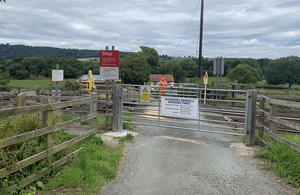Collision at Smiths Lower Cefn user-worked crossing
Preliminary examination into a collision at Smiths Lower Cefn user-worked crossing, near Welshpool, on 22 June 2020.

Smiths Lower Cefn user-worked crossing shown on 22 July 2020, following repair work (image courtesy of Network Rail).
At around 13:44 hrs on Monday 22 June 2020, a Transport for Wales (TfW) train struck a van which was foul of the track at Smiths Lower Cefn user-worked crossing (UWC), near Welshpool. When the collision occurred, the van driver was in the area of the vehicle’s open offside door. The collision caused the van to spin around, projecting the van driver into an adjacent field. The van driver suffered serious, life affecting injuries because of the collision. Based on the evidence found on site, and the position of the van as was seen on the train’s forward-facing CCTV, RAIB considers that it is possible that the far side gate of the crossing began to swing back as the van crossed, causing the driver to stop and attempt to get out of the van while it was still foul of the line.
TfW notified RAIB of the accident soon after it occurred. We have since gathered evidence from the railway industry and carried out a preliminary examination into the circumstances in which it occurred.
Based on the evidence gathered, RAIB has concluded that the accident occurred because the van driver did not call the signaller in control of the crossing to get permission to cross, prior to doing so. RAIB has not been able to determine with certainty why he did not call. The van driver was unfamiliar with the crossing, and with user worked crossings in general. RAIB considers that it is probably the case that the van driver also did not read some, or all of the instructions on the signage at the crossing, prior to using it.
RAIB has reviewed the findings of its preliminary examination and has decided not to carry out any further investigation of the accident. RAIB previously investigated a similar accident at Frognal Farm UWC in October 2017 (RAIB report 10/2019), which covered topics relevant to the accident at Smiths Lower Cefn UWC. Findings from that investigation showed that the van driver in that accident also did not use the telephone to contact the signaller. This was in part because the information on the signs at the crossing were not clear and concise, and unfamiliar users could misunderstand the instructions. Of particular relevance to the accident at Smiths Lower Cefn UWC was RAIB’s finding that the requirement to stop and call the signaller could be overlooked as it was not present in the numbered list of instructions lower down the sign.
RAIB made four recommendations from the Frognal Farm investigation. Two of these, addressed to a combination of Network Rail, the Office of Rail and Road (ORR) and the Department for Transport (DfT), specifically related to the provision of signage, and improving the clarity, conspicuity and wording of instructions to crossing users. At the time of writing, both recommendations are being progressed towards implementation.
Recommendation 1 also considers the issue of how authorised users are expected to be briefed in the context of the ever-increasing use of contractor-driven delivery vehicles to private and commercial properties. This also raises the more general issue of the concept of an authorised user in the current circumstances.
RAIB has previously carried out many investigations into other accidents and near-miss incidents at user worked crossings, including a class investigation (RAIB report 13/2009) into such crossings, which was published in 2009. The class investigation noted a previous collision at Smiths Lower Cefn UWC on 10 September 2008, where the driver of a lorry admitted using the crossing without calling the signaller. Near-miss incidents at such crossings are often notified to RAIB or are seen in Network Rail’s daily control log. An investigation into a near-miss at Coltishall Lane UWC-T on 21 January 2021 is currently ongoing (details on the RAIB website).
Given the risk posed by such crossings, and the large number still present on the network, RAIB remains concerned that accidents and incidents will continue to occur unless substantive action is taken.
RAIB has written to Network Rail, copied to ORR and DfT, to alert them to this event and the need for action to implement previously made recommendations.